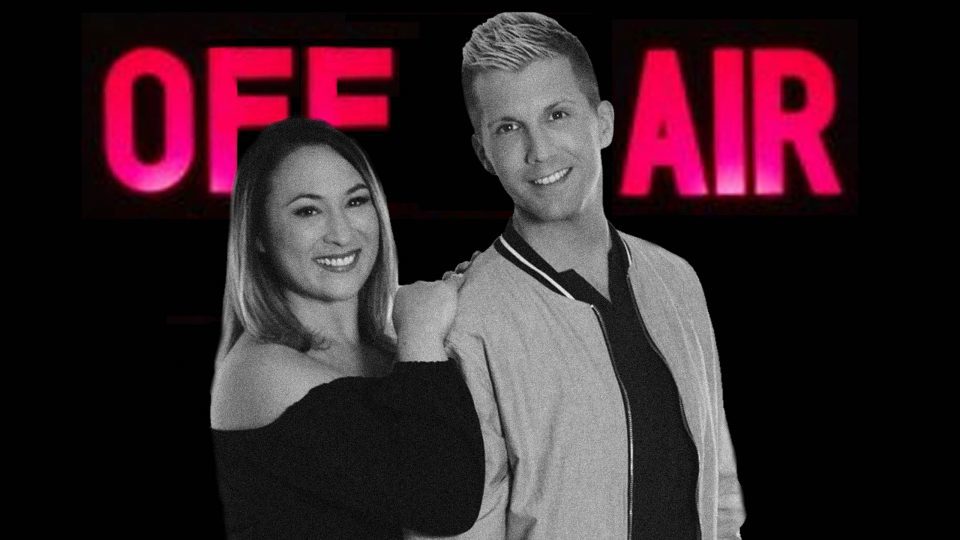During Ottawa’s Pride week in August, a young boy came up to local radio host, Jesse Reynolds his eyes brimming with tears. Reynolds had inspired him to come out, he shared. His mother was a fan of Reynold’s morning show, JUMP! 106.9, which included a lot of coverage of Pride and on which Reynold’s talked about being gay. Listening to him, gave the young man courage to come out.
Two days after this encounter, Reynolds was told that the morning show, which he co-hosts with Jenna Mo, was cancelled.
Corus Entertainment, which owns JUMP! 106.9 has replaced Reynolds and Mo’s 5:30 a.m. morning slot with an American syndicated program called Brooke & Jubal in the Morning. The move, the media company says, is part of its “restructuring efforts.”
Reynolds said the initial backlash from the local community towards the change was overwhelming, as has been the support he’s received.


Now, about a month after the news broke, the two are back with a podcast ‘Jesse And Jenna’s Messy Podcast,’ which had a strong positive reaction on social media from fans and has a five star rating on iTunes. The first episode debuted on September 21 and they have plans to continue to release episodes every Friday.
The two take a no-filter approach on the podcast and discuss everything from celebrity news to entertaining local stories and their “unemployed lives.” The podcast is hosted on John Mielke’s platform Blast The Radio, which hosts over 60 Ottawa-based shows and music acts. Mielke himself saw a 23 year career in Ottawa radio come to an end in November 2014 due to a format change.
Many fans have shown an outpouring of support including comments like: “After losing Jesse and Jenna and our favourite morning show, we listened to their first podcast this morning while we had our coffee and it felt like home,” said iTunes user, klap29.
Toronto local radio host Raina Douris from the alternative music station Indie88 took to Twitter after hearing about what happened at JUMP!106.9. “How can we support Canadian artists & culture if all that matters is the bottom line? How can we get our own work heard and seen if we’re syndicating everything from the States[?]” Douris writes. “Let this serve as a reminder that the telecoms we’ve chosen to endow with the power to arbitrate our cultural experience are bound by nothing but markets & money — and not our interests as a country or people or community or culture.”
In January 2016, Corus Entertainment acquired Shaw Communications resulting in Corus owning 45 specialty and 15 conventional television stations as well as 39 radio stations. In May, the company announced a series of major layoffs as a result of the merger. The number of layoffs was not disclosed but jobs in sales, marketing, technology, content, and international development were affected.
At the end of June of this year, Corus Entertainment’s stock plummeted after slashing its television and radio assets by $1 billion. Global News, which is also owned by Corus Entertainment, cut nearly 70 jobs at the beginning of the year.
But the layoffs at JUMP! 106.9 are the first at the Ottawa station and Reynolds says he hopes it doesn’t become a trend.
“At a time where we’re starting to feel more and more like one world with everyone being connected, sharing the same viral videos and memes, it seems that local TV and local radio are some of the only things that are giving people a connection to their own town or city, especially in smaller cities than Ottawa and Toronto,” Reynolds said. “How are they going to find out what’s going on without local radio? You need it.”
According to Rishma Govani, the senior manager of news and radio communications at Corus Entertainment, the company makes periodic programming decisions based on their ratings. Throughout the morning on JUMP, there will still be local news and traffic as well as local promos from Ottawa. The only missing element, she says, are the hosts.
Govani said that the changes are in alignment with their goal of JUMP! 106.9 being “the #1 destination for Canadian audiences.” But Canadian audiences seemed to disagree, at least based on their responses on social media.
“Radio is a public commodity and they have to give people what they want,” Reynolds said. “The only way to keep things local is to make sure that the powers know that’s what people want.”
